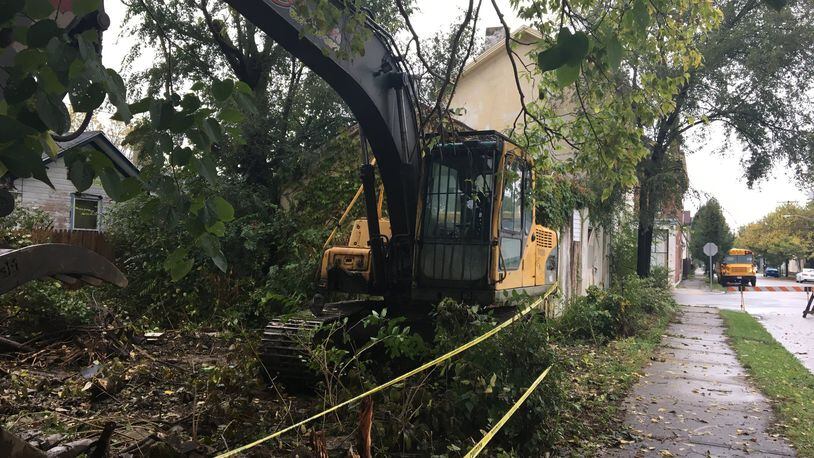“We are concerned it may go away,” said Mary Crockett, community development coordinator in the City of Xenia. “We don’t see anything replacing it.”
Last week in Lebanon, the Warren County Board of Commissioners delayed action on $700,000 in CDBG grant requests until a decision is made on the future of the program.
RELATED: Trump budget takes aim at dozens of government programs
Dayton has received more than $57 million in CDBG funds since 2007, used to knock down blighted properties, resurface residential streets, enforce city code and help secure and upgrade housing for the homeless, the elderly, veterans and low-income families.
RELATED: Dayton, Montgomery County leaders oppose Trump budget cut plan
“It’s one of the most effective uses of federal dollars,” Dayton Mayor Nan Whaley said earlier this month.
Montgomery County, which received $8.5 million from the CDBG program in the last five years, uses the money for infrastructure projects, demolition, housing rehab and small business grants and upgrades for places to become compliant with the American with Disabilities Act.
“If that funding goes away, it’s going to be devastating, especially in the urban areas,” said Michael Colbert, assistant Montgomery County administrator.
Trump proposes pulling all funding for the CDBG program, which has provided more than $150 billion to U.S. communities since its inception in 1974.
“We are going to do more with less, and make the government lean and accountable to the people,” Trump said in the budget document.
Last month, U.S. Rep. Mike Turner, R-Dayton, signed a “dear colleague” letter urging a Congressional subcommittee on appropriations to provide at least $3.3 billion in funding for the CDBG program in fiscal year 2018, according to the National Low Income Housing Coalition. On Friday, Turner’s office said nothing had changed.
Other co-sponsors included U.S. Reps. Joyce Beatty, D-Jefferson Twp., Marcia Fudge, D-Warrensville Heights; and Lou Barletta, R-Pa.
Dayton is among Ohio cities that apply to HUD in Washington D.C. Other local governments, including counties and municipalities, apply through the Ohio Development Services Agency.
RELATED: Dayton’s 5-year plan for CDBG funds
Greene County is going ahead with plans to apply for CDBG funds through the state, despite concerns about the program’s future.
On May 4, Kristie Tidd, the county’s community development coordinator, plans to outline for commissioners a list of $200,000 in requests, ranging from $48,500 for Jamestown Opera House renovations to $25,000 for a revolving loan fund for low-income home repairs in Yellow Springs.
“We are proud supporters of this program. It’s very helpful to our communities,” Tidd said, adding she was contacting area recipients, encouraging them to contact their lawmakers about the proposed program elimination.
While uncertain about the funding’s future, Xenia and Warren County officials already moved forward with public hearings required to qualify for assistance through the federal program, signed into law by President Richard M. Nixon.
In past years, Xenia has received $75,000 to $80,000 a year. Before the cuts proposed by Trump, the city was anticipating $150,000 every two years under a new process begun this year.
Xenia officials are weighing whether to pursue another HUD grant, while hoping the CDBG program is funded in 2018, when it again expected to benefit from the program, Crockett said.
“We may just continue planning for next year,” Crockett said, noting CDBG funds provided for loans used to redo the facades of 10 downtown buildings.
Warren County commissioners signed off on a list of recipients seeking about $700,000, based on recent annual allocations for projects in low-income areas of the generally affluent county.
RELATED: Warren County holds off on $700,000 in grant requests
Also, Matt Schnipke, the county’s economic development specialist, was cleared to promote continuation of the program during the upcoming Warren County Chamber Alliance’s annual fly-in to Washington D.C.
MORE: Warren County Chamber Alliance’s first Washington D.C. lobbying trip
The reaction in Warren County, a Republican stronghold, shows bipartisan support for the program.
This year’s list is topped by $277,900 for repairs on Cambridge Court, Georgetown Drive, Raintree Trail and Winding Way, streets within lower-income neighborhoods in Lebanon.
The program also would provide $160,000 to fix Harriet and Olive avenues and Mentz Road in Franklin and $90,000 for local administration. It also included funds for a playground upgrade in Butlerville, among other projects.
RELATED: No federal grant for Franklin museum
SOCIAL MEDIA:Follow Lawrence Budd on Twitter
News of CDBG cuts emerged last month when the Trump administration proposed general budgets for federal agencies, including HUD.
DOWNLOAD OUR FREE MOBILE APPS FOR THE LATEST BREAKING NEWS
"The blueprint reflects the President's commitment to support HUD's critical functions that provide rental assistance to low-income and vulnerable households and to help work-eligible families achieve self-sufficiency. It also recognizes a greater role for state and local governments, and the private sector to address community and economic development needs. " according to a statement on the HUD web site. "A more detailed program-by-program budget proposal will be announced in May."
